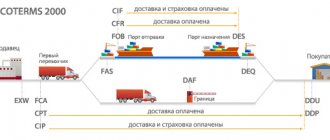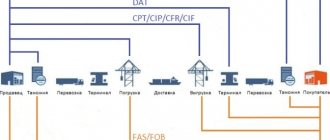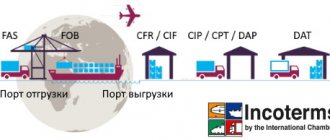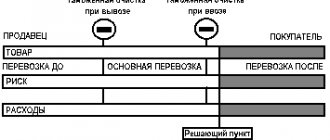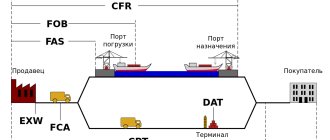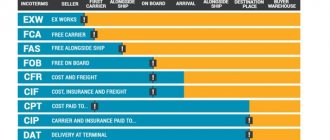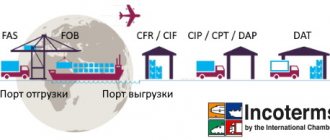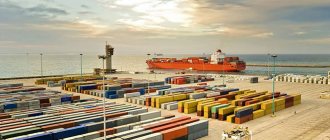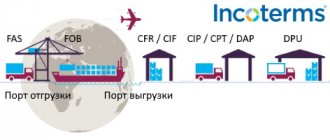International trade and economic relations develop according to special rules. An example of these is the Incoterms rules, which establish various criteria for trade between countries. These rules are valid as amended in 2010 and are currently relevant. They also introduced the term EXW (Ex Works). It is derived from the German "Ab Werk" and literally means "from stock". The translation “Free warehouse” is more often used - this is how the pickup condition is called in the trading environment.
This concept denotes the supply of goods and materials by the seller, carried out at its premises, enterprises, warehouses, and retail outlets. He transfers the goods and materials to the acquirer, and at the time of transfer is considered to have fulfilled his obligations. The seller must not perform loading or other actions that usually accompany the removal of goods. Let's take a closer look at the EXW delivery conditions.
Explanation of EXW INCOTERM 2010: pickup or free warehouse
EXW is a shortened form of the English "Ex Works". There are several translations of this concept:
- "From the warehouse." This is a literal translation and is used quite rarely.
- "Ex-Warehouse". A more common interpretation is EXW, which is the generally accepted translation of the concept.
- "Pickup." It is used, as a rule, in commercial use.
The use of this term implies adherence to certain rules.
- Firstly, the locality in which the object is located (factory, plant, etc.) must be indicated next to it.
- Secondly, it is necessary to indicate the exact address of the object. If it is located in a small city or other small locality, indicate not only the exact address, but also the nearest administrative center.
- Thirdly, the use of this definition in trade assumes that the goods are already in the warehouse of the object.
Having a problem? Call our customs specialist:
Moscow and region (call is free)
Saint Petersburg
CFR (Cost and Freight)
Under CFR, CIF rules apply, but there is no insurance . This condition is indicated when the seller does not want to insure the cargo.
That is, the supplier relieves himself of obligations for the cargo when he transfers it to the buyer on board the ship, and also clears it at the customs of the country of export, paying duties. In this case, the seller pays for freight. Import and unloading upon arrival is the responsibility of the buyer.
Still confused about the terms? Contact specialists - PartnerTrade managers will be happy to advise you on any direction and conditions of cargo delivery. We are waiting for your calls on the numbers in our contacts.
What are the EXW INCOTERMS 2010 delivery conditions?
Delivery on EXW INCOTERMS 2010 allows you to regulate the interaction between buyer and seller. The seller is maximally protected from possible losses and risks. The responsibility of this person is to have the product available on site at the place and time specified in the contract. The quality of the product specified in the contract must be observed. Having fulfilled these obligations, the seller is completely released from further liability.
At the warehouse, the buyer receives the product and, accordingly, ownership. From this moment on, the buyer himself bears all responsibility.
After acceptance of the goods, possible risks are also assigned to the buyer. This means that any damage to the product during loading or transportation is not the fault of the seller, but of the buyer, his authorized representative or the forwarder.
It is worth noting that the term “Ex Works INCOTERM 2010” does not apply when the seller or intermediary cannot carry out customs clearance of the product. In this case, problems may arise when transporting cargo. Then another definition is applied - INCOTERMS 2010 FCA. It is also relevant for international trade. But this term can only be used if the seller is willing to bear the possible costs of transporting the goods.
FOB (Free On Board)
During the FOB , the seller undertakes to deliver the goods to the ship and load them on board. It provides all logistics , including loading onto the ship, and pays for it from the moment of loading until the container is transferred overboard the ship .
An important point: the seller transfers rights to the cargo at the moment when the container crosses the side of the ship. After this, the buyer guarantees for the cargo. He must also charter space for the goods and pay subsequent costs.
Roughly speaking, FOB is all local expenses at the supplier’s territory until loading on board the vessel. After this, responsibility for the cargo and its costs rests with the consignee.
Basic terms of incoterms - terms of delivery EXW, FCA, FOB, CIF and CFR
Watch this video on YouTube.
Responsibilities of the seller under EXW
Each party to the contract has certain responsibilities. Consider the seller's responsibilities for selling and transporting goods ex-factory.
General Responsibilities
A person must provide his partner not only with the product itself, but also with the following documents:
- Invoice.
- Documents that confirm the conformity of the product in quality and quantity in accordance with the previously concluded purchase and sale agreement.
The document can be provided in either paper or electronic form.
Providing licenses, permits, etc.
The buyer has the right to demand from the person who sells the goods a license or permission to sell the goods, a document confirming the completion of a safety check and other papers.
In this case, he assumes all costs and risks. In turn, the seller is obliged to provide his partner with such documents. They can be in paper or electronic form.
Transportation and insurance contracts
The person who sells the goods does not have any responsibilities related to procedures such as concluding transportation and insurance contracts. But a person can, at the request of his partner, provide him with all the information necessary for successful transportation and insurance of the product.
Product delivery
The person responsible for the sale of the goods must deliver it to the place specified in the contract exactly on time. Loading of the product into the vehicle is carried out by the buyer himself.
Transfer of risks
Initially, all risks associated with the quality of the goods, their transportation and other issues are borne by the seller himself. But after delivery, they are completely transferred to the buyer.
Notice
The person responsible for the sale of the goods must send his partner any notice that may be useful to him for the implementation of the procedure for the delivery and acceptance of the goods.
Checking the quality of the product, its packaging and labeling
The seller is responsible for ensuring that the quality of the goods corresponds to the purchase and sale agreement. But these responsibilities lie with him only before the procedure for accepting the goods.
Product packaging is carried out at the expense of the person responsible for its sale. The exception is those goods that can be transported without separate packaging. Labeling is also a must.
Packaging must comply with all transportation rules so that the quality of the cargo does not suffer during transportation.
Provision of information
The seller’s responsibility also includes assistance in providing the buyer with all the necessary documentation for transportation, customs registration, product safety checks and other procedures. The provision of information occurs at the request of the partner. In this case, the buyer assumes all risks and costs.
CIF (Cost, Insurance and Freight)
CIF includes - this is essentially FOB rules , except that sea freight and insurance is the responsibility of the shipper .
He also undertakes to make an export declaration, deliver the container to the port, pay for loading and unloading, insurance, loading on board the vessel, as well as sea freight to the destination port.
The financial responsibility of the consignee begins at the moment the ship arrives at the port of destination - this includes unloading, customs clearance, customs clearance and delivery throughout the country of export.
Buyer's responsibilities
The buyer must also comply with a certain list of responsibilities.
General Responsibilities
The main responsibility is to pay for the goods in full. Payment must be made strictly in accordance with the purchase and sale agreement.
Licenses, permits, etc.
A person can request from his partner licenses to sell goods, permits and other documents. But it must bear the costs and risks entirely.
Documents can be provided electronically or on paper.
Transportation and insurance contracts
Like the seller, the buyer has no obligations related to the conclusion of documents such as contracts of carriage and insurance.
Acceptance of delivery of goods
The person must accept delivery of the goods at the place and time specified in the sales contract. It assumes all costs and risks for pickup according to INCOTERMS 2010.
According to EXW, the seller is maximally protected from losses and risks.
Transfer of risks
All risks pass to the buyer upon acceptance of delivery of the goods. Risks may include damage to the product during loading or transportation.
If this rule is not observed, the person is responsible for the condition of the goods from the date specified in the sales contract.
Cost Allocation
The Buyer is obliged to bear the following responsibilities related to the distribution of costs:
- Payment of costs for goods immediately after acceptance of delivery.
- Payment of additional expenses.
- Payment of taxes, fees and other duties when importing a product.
- Payment of the seller's expenses for providing documents and necessary information.
Notice
If a person is responsible for determining the place and time of acceptance of delivery of goods, then he must inform his partner about the decision made.
Proof of acceptance of delivery
The person must provide his partner with all documents that can confirm the fact of acceptance of delivery of the goods.
What does EXW mean: decoding
The term EXW is derived from the phrase “Ex Works” / “ExWarehouse”, which is translated from English literally as “from / “from warehouse”. In the light of the International Rules for the Interpretation of Trade Terms “Incoterms 2010”, it is used as one of the rules observed by the parties to an international trade partnership when making deliveries from one country to another.
This term, along with other concepts disclosed by Incoterms, is included in the export and import sales contract in all countries and serves as guidance for importers, exporters, logisticians, insurers and other parties to the international transportation process.
What else is dangerous about self-pickup?
In addition to the fact that loading takes place at the expense of the buyer’s efforts, there are several other unpleasant moments.
An important point is that when concluding a contract on EW Works terms, the implementer is in no way responsible for completing customs formalities. All of them also fall on the shoulders of the buyer. Because of this, it is recommended to enter into such a contract only if the buyer is confident that he is able to carry out all customs operations if they are required in the future.
And the last thing a buyer can expect when concluding a pickup agreement is the provision of various papers. Despite the fact that the rights to provide papers are very limited, the seller may require them in order to provide them to the tax service or his own company for reporting.
Transaction risks
It is important to note that concluding a contract with subsequent pickup of goods should be carried out with caution, as there are some pitfalls.
A very unpleasant part of this agreement is that loading falls on the shoulders of the buyer, although most often it is the seller of the cargo who is in the best position to perform this action. It is also worth noting that if the loading is carried out by the seller, then all risks will still lie with the buyer. That is why it is better to enter into agreements with the abbreviation FCA, which transfers the risks of loading from the buyer to the seller.
What is franking
An ex-warehouse is a place to which, under the terms of the contract, the supplier undertakes to deliver inventory items. At this point, the right to inventory items and responsibility for their safety is transferred from the supplier to the client. Until the shipment reaches this point, all shipping costs and risks are borne by the shipper.
Pricing largely depends on the ex-warehouse, because manufacturers include delivery costs in the price of goods. Accordingly, the closer the destination, the less additional cost is included in the price of goods and materials.
The term “free” is always used in conjunction with the delivery point, for example, free-wagon, free-airport, free-port, and so on. The most popular types of franco are:
